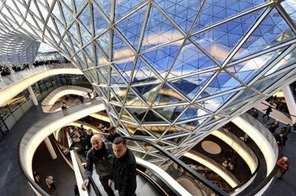Relapse feared even as German retail rebounds
FRANKFURT: German retail sales posted their first rise since April last month, but economists warned headwinds could stall a sustained rebound in consumption in Europe's biggest economy.
Retail sales gained 0.7 percent in July from the previous month, provisional data released Tuesday by the national statistics office showed.
In June, retail sales had fallen by 1.3 percent on a monthly basis, the Destatis office said in an upwards revision of the previous month's data.
Destatis based its seasonally adjusted figures on seven German states which represent around 76 percent of all retail sales in the country.
On an annual basis, sales fell by 1.0 percent in July, it said.
The data showed that sales of food products gained 0.1 percent on the year, while sales of items such as household appliances, cosmetics and books had fallen by 1.5 percent, Destatis said.
Auto sales were not included in the statistics.
"After two months of decline, German retail sales finally increased again in July," ING senior economist Carsten Brzeski commented.
"This increase is good news and confirms that the recovery will accelerate in the third quarter," he added.
Germany has rebounded with unexpected speed from its worst recession in more than six decades, edging back to growth in the second quarter of this year with an expansion of 0.3 percent.
Brzeski nonetheless noted that retail sales figures had to be taken with caution since they were often revised by significant amounts.
Figures on German unemployment, a key influence on consumer spending, were to be released later in the day.
Brzeski also felt that private consumption had only limited potential to be a major source of growth.
"Finding a way to lower the savings rate and to open the consumers' wallets will be one of the main challenges for the new government after the elections" on September 27, he said.
UniCredit economist Alexander Koch added that with a German car-scrapping bonus tapering off, "the continuing negative outlook for the labor market should increasingly gain the upper hand towards year-end.
"Hence, even after the end of the general recession, a delayed consumer recession remains probable," he warned.






